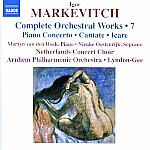First, in case there’s any confusion: this was originally released on Marco Polo as Volume 6 for reasons we don’t need to discuss. On Naxos it’s now Volume 7 in the series of Markevitch orchestral music. Suffice it to say that all of the same music is here, and it’s great stuff. Markevitch was only 17 when he completed his Piano Concerto in 1929, but there’s nothing immature about it. The outer movements are motoric and neoclassical in the manner of Hindemith, while the central march recalls Kurt Weill, or perhaps anticipates the finale of Shostakovich’s Fourth Symphony. The piano writing is mostly in two parts, with lots of rhythmic displacement (especially in the first movement, which freely mingles 6/8 with 3/4). Martyn van den Hoek gives a sparkling performance of the solo part–perhaps my only quibble is that he could have made a bit more of the allargando leading into the first movement recapitulation, but this is a very tiny point.
Cantata, to a text by Jean Cocteau, was a Diaghilev commission, one of his very last. Composed for soprano, male choir, and orchestra, once again the style (especially the chorale at the end) recalls Weill and the German school of the 1920s, even though the work’s French origins will naturally bring to mind Roussel and Martinu. Soprano Nienke Oostenrijk sings with a pleasing tone, not always the case with unfamiliar contemporary music, and once again Lyndon-Gee delivers amazingly confident performances given the trickiness of the idiom.
Icare is arguably Markevitch’s masterpiece, one of the great ballets of the 20th century. The version given here is the composer’s revision of 1943, one with slightly clarified textures, a touch more melodic interest, and no quarter-tones. It’s tempting to say that he was trying to sweeten the pill, but the truth is that both versions are perfectly valid and the overall impression isn’t hugely different. The music is fabulous, and a few split chords for full orchestra aside, Lyndon-Gee and his team do it full justice. The conductor is particularly adept in the constantly changing tempos of “Icare and the Birds”. The fateful flight itself has the right relentless intensity (and a bit of Prokofiev in his “mechanical” mode), while the concluding “Death of Icarus” is unforgettably ethereal, and all the more moving in its lack of sentimentality.
These performances are all extremely well engineered. In the Concerto the solo piano is well balanced within the orchestral texture (it plays along with the ensemble much of the time), and in the Cantata the vocal forces project the text well without obscuring the instrumental lines. It would have been nice, though, if the conductor’s full name appeared somewhere on the tray cards–you need to look at the excellent notes to find it. If you don’t know Markevitch the composer, this is probably the best place to start. [Note: Special thanks to Boosey & Hawkes for making available scores of the works that have not yet been published in Study format.] [1/31/2011]
































